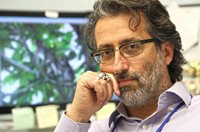"The (Pan-American Dengue Research Meeting) meeting serves as a venue to recruit bright and young scientists from all over the Americas as ACAV members." - Nikos Vasilakis, PhD, FASTMH
Nikos Vasilakis, PhD, FASTMH, Chair of the American Committee on Arthropod-Borne Viruses (ACAV) subgroup, is Chair of the
6th Pan-American Dengue Research Meeting, which takes place April 9-12, 2018, in Galveston, Texas. The meeting will review research related to Dengue and other arboviruses, including zika, chikungunya, mayaro, among others, with special emphasis on those carried out in Latin America. Dr. Vasilakis spoke about the meeting and its relevance to ACAV.
 How does the work of ACAV intersect with the Pan-American Dengue Research Meeting?
How does the work of ACAV intersect with the Pan-American Dengue Research Meeting?
Historically, some members of ACAV/ASTMH were founding members of the Pan Dengue Net and several served in leadership positions as members of the executive, organizing and scientific committees. Additionally, the topics covered in our meetings are intricately intertwined with the scientific interests of many ACAV members, and importantly, the meetings serve as a venue to recruit bright and young scientists from all over the Americas as ACAV members.
Please tell us about the influence that ASTMH members Bob Tesh and Hilda Guzman have had on your career and the careers of others.
For 40 years this husband/wife team were the curators of the World Reference Collection of Emerging Viruses and Arboviruses (WRCEVA). The WRCEVA, located for the past 23 years at University of Texas Medical Branch in Galveston, is the largest library of viruses, including over 11,000 virus strains and antigens. These include representative strains of most of the known arthropod-transmitted and zoonotic viruses affecting humans. Isolates from the 1920s to present from throughout world are also represented. The main foci of interest of the collection is to collect, curate and distribute viruses, characterize novel viruses, study their ecology, pathogenesis, structure and taxonomy, as well as train and educate scientists during all stages of their career. During the past 40 years, Bob and Hilda served as mentors, precepts, colleagues, advisors and friends to numerous scientists from all over the world, many of them, current or past members of the ASTMH or ACAV, many of whom served in leadership positions in either ASTMH or ACAV. My personal interaction started in 2002 when Dr. Tesh served as a member of my dissertation committee, a relationship that continues to the present day. Dr Tesh also served as my faculty mentor at the Department of Pathology at UTMB; that which collaboration led to the discovery of three new taxa of insect specific viruses that defy identification using traditional methods, as well as discovery and characterization of many other unidentified arboviruses.
What will be the hot topics in arbovirology at the meeting?
Historically the Pan Dengue Net meetings focused on dengue virus; however, starting with our meeting in Panama two years ago, we expanded the scope of subjects to include other arboviruses (e.g. chikungunya, Zika, mayaro, etc.) presenting a public health threat in the Americas. This year one of the hot topics will be interaction among Zika and other flavi- and/or alpha viruses and the impact on the clinical presentations. The meeting agenda will also include new data on the epidemiology and clinical presentation of Zika virus infection. Latest advances in dengue vaccine development will be discussed as well.
Click
here for more information about the 6th Pan-American Dengue Research Meeting, April 9-12, 2018, in Galveston, Texas